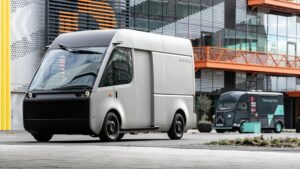
An electric vehicle start-up that once claimed to be one of Britain’s biggest unicorns has warned that it does not have enough cash to keep going for the next year and will not generate revenue until 2024.
Shares in the New York-listed Arrival dropped by 35.9 per cent, or 21 cents, to close at 38 cents in New York last night after it warned of “material uncertainties about going concern” and reported widening quarterly losses.
Declaring that all options to obtain funding were on the table, Arrival said a previous plan to raise hundreds of millions of dollars — in order to deliver its first vehicles in Britain this year and to launch a microfactory in the United States next year — had been shelved “due to the current market cap and average daily trading volumes”.
Since it went public via a “blank cheque” merger in March 2021, Arrival’s stock has dropped by 98 per cent. It has been informed by the operator of the Nasdaq exchange that it will be delisted if its shares fail to change hands for more than $1 for at least ten consecutive business days before May.
Arrival has drawn up plans for “sizeable” cuts to its workforce, mainly in Britain, in an attempt to “extend the cash runway”. It finished September with cash and cash equivalents of about $330 million, after its cash balance fell by about $180 million during the preceding three months. Losses widened to $310.3 million in the quarter, from $30.6 million in the same period in 2021.
The business, founded and led by Denis Sverdlov, 44, a Russian billionaire, has sought to crack the commercial transit sector with zero-emission vehicles. Investment from Hyundai and Kia in 2020 prompted Arrival to proclaim itself one of the UK’s largest unicorns — privately held start-ups valued at more than $1 billion. It also has a deal to make 10,000 electric vans for UPS, the global delivery group.
However, Arrival’s valuation, once above $13 billion, has collapsed to less than $270 million. Its manufacturing strategy is built around “microfactories” rather than sprawling, expensive plants, although it has pushed back production in America.
Sverdlov said that 2022 had been “a challenging year for Arrival as well as the entire sector, but we are agile in responding to these challenges. Our valuable IP developed through an impressive stack of in-house technologies gives us a unique advantage in developing electric vehicles and adapting to new market conditions quickly.
“We will continue to build a small number of vans in Bicester while advancing our composite materials, components, vehicle software, autonomous mobile robotics and microfactory to bring our products to the US market.”
Read more:
Electric vehicle start-up Arrival runs out of juice





